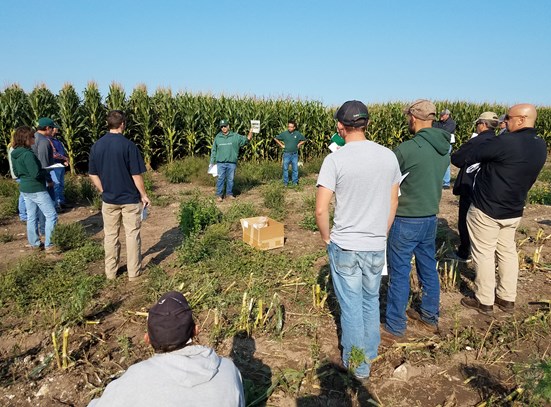Supporting Food and Agriculture in Montmorency County
A look at Extension's involvement regarding agriculture and food in Montmorency County.

Michigan agriculture continues to be a diverse and thriving segment of the state’s economy. When you support MSU Extension, you help producers develop efficient farming practices that optimize the use of inputs to enhance productivity while protecting soil and water resources. This education leads to better use of time, money and human capital, which helps retain and create agricultural jobs. Together, these measures strengthen Michigan’s economy, encouraging growth of a sustainable and prosperous Michigan food and agriculture system.
The MSU Extension agriculture program in Northeast Lower Michigan leveraged $180,672 in external funding and generated over $246,000 in savings or added revenue for Michigan producers in 2017.
Field Crop Variety Evaluation
Better than 50% of the upward trend in crop yields over the last several decades can be attributed to genetic improvements achieved through breeding and selection. Selecting the right crop variety for each field is a critical management decision that can make or break a farmer’s season. Unfortunately, variety performance information applicable to Northern Michigan can be hard to come by due to the limited number of farms and unique growing conditions in our region. To fill this gap, MSU Extension has invested in variety evaluation for several crops, conducting four on-farm variety trials in corn, dry beans, potatoes and malting barley during 2017.
- Three field day events were held in 2017 to highlight variety performance evaluation projects in corn, dry beans and potatoes, attracting a total of 66 participants.
- Our corn hybrid trial in Posen, MI evaluated 37 grain and 43 silage hybrids, finding 53 bu/a and 2.9 T/a differences between the lowest and highest yielding hybrids. These yield differences translate into $200/a (grain) and $1,600/a (milk) of gross revenue for local farmers simply by selecting the best corn hybrid.
Addressing Sulfur Deficiency in Alfalfa Hay
Sulfur is an essential element for forage yield, quality regrowth, and stand durability. Alfalfa utilizes more sulfur than many other field crops, approximately 5-6 lbs. per ton of dry matter harvested. A 2015 state-wide survey of tissue sulfur levels found that 88% of Northeast Michigan alfalfa fields tested were sulfur deficient. To remedy these deficiencies, MSU Extension conducted two years of research testing the impact of different sulfur fertilizer sources on alfalfa-grass hay yield and quality.
- Our research found that 25 lbs/a of sulfur as gypsum can increase alfalfa hay yield up to 1 TDM/a, and net farm income by $81/a.

Targeting Tillage to Jumpstart MI Soybeans
Michigan soybean growers till the soil for many reasons such as seed bed preparation, amendment incorporation and weed control. However, tillage operations can be costly in terms of machinery, fuel and labor, and often degrade soil health. Since 2016, MSU Extension has partnered with the Michigan Soybean Promotion Committee and 33 farms across the state to investigate site-specific relationships between tillage intensity, soil health and soybean performance. After two years of hard work, this project is generating valuable data to help farmers make informed decisions that balance the potential costs and benefits of tillage.
- Over two years, the Jumpstarting Michigan Soybean Production project monitored 133 soybean fields divided into 273 zones, visiting each field four times annually for crop and soil sampling.
- The project has identified six unique environmental clusters (see map above), within which soybeans respond predictably to tillage.
- By following the tillage recommendations generated by our project, growers could increase soybean yields 7-21 bu/a on average, increasing net farm revenue by $40-$180 per acre while also protecting soil health.
Field Crops Webinar Series

In 2017, MSU Extension Montmorency Co. offered seven one-hour webinars as part of the fifth annual Field Crops Webinar Series. The program was designed to share key production points from MSUE’s traditional winter meetings with underserved audiences that cannot not attend in-person programs due to geography, scheduling or ability. 104 individuals from 44 Michigan counties, two other states and Ontario participated in the program, resulting in 490 live webinar views.
- Evaluation of this program revealed that at least 15,296 acres of field crops and forage were exposed to practices that mitigate risk, increase yield, improve quality, or decrease inputs as a result of the series, generating a total of $123,300 in savings or added revenue during 2017.
- This program is one of very few opportunities for certified pesticide applicators to earn MDARD recertification credits online, and participants earned a total of 374 credits by participating in the series.
Participants commented:
- “These webinars help us stay current with best practices and ideas; looking at the trend line yield shows how far we've come over the past 40 years!”
- “These webinars are certainly well worth the effort and greatly appreciated. Thank you!”




 Print
Print Email
Email



